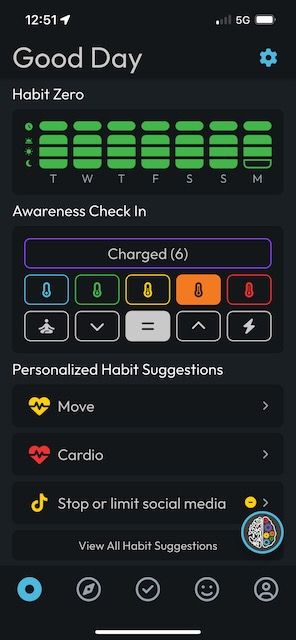
Yes, News Addiction Is A Thing!
News addiction is a real thing.
Our brains love scanning the world for problems; every time we find one, our brain rewards us with a little squirt of dopamine.
Do this enough times, and voila, you have installed a mindless habit.
Once installed, we make up stories of how we must stay connected to what is happening in the world.
The problem with news is that it’s a reactive distraction that makes you feel like shit.
It drains you of the energy required to deal with your stuff.
It brings you down by adding additional problems to your already complicated life.
It makes you feel anxious and fills you with unnecessary stress.
The American Psychological Association reports that one in 10 people check the news every hour, and 20 percent constantly monitor their social media feeds.
According to media studies, 89 percent of news stories are negative, with 17 negative news reports for every positive one.
News watching has been linked to increased stress, anxiety, depression, fatigue, and insomnia.
When we watch the news, gigabytes of stress hormones get dumped into our bloodstream, which is linked with long-term health issues, including high blood pressure, arthritis, and cardiovascular disease.
Here are three reasons to avoid the news …
1) News outlets sensationalize problems to keep you addicted.
News outlets are businesses.
The more you watch, the more money they make.
This means that they need to keep you watching, and they do this by hooking you with negative stories and mindless entertainment.
And once we are hooked, we go down the rabbit hole and come out the other side filled with anxiety and stress.
Because of our negativity bias, the only way to not get hooked is to not watch in the first place.
As neuroscientist Rick Hansen says, “The brain is like Velcro for negative experiences and Teflon for positive ones.”
You may think you are in control, but that’s the short-term dopamine reward speaking.
2) News outlets don’t give you the whole story.
It’s no secret that networks control the news; those same networks have agendas, and that agenda is to promote a specific point of view.
Regardless of how you get your news, it’s biased, and that bias is shaping your reality.
Take back your personal power by expanding your perspective, getting the whole story and choosing how you are going to view the world.
3) You will still find out what is happening in the world.
What surprises people the most when they experiment with news-fasting is that they still discover what is happening in the world.
I’ve news-fasted for over ten years and still heard about COVID, the wars and local politics.
Unless you are a hermit, people talk about recent events.
But instead of getting caught up in the negative sensationalization of the news, I’m talking and connecting with people.
I’m getting their perspective, their point of view, their concerns, their worries, and their opinions.
All this without the negativity-biased, anxiety and stress-inducing, time-wasting, and energy-draining that happens when you engage with the news.
How To News-Fast
Here are a few tips on how to get started with news-fasting.
1) Inventory Your Consumption
Start by taking a quick inventory of your news consumption.
Common news sources include TV, internet, social media, email, newspaper, magazines and radio.
Take a moment now to list how you get your news.
Go ahead, I’ll wait.
Ready?
Let’s move to step 2.
2) Track Your Time
Once you know how much you consume, you need to track how much.
Keep your list from the previous step with you for 24 hours and note how much time is spent consuming each news source.
3) Start Small
There are two approaches to news-fasting, either all-in or starting small.
If the thought of going all-in causes you anxiety, I suggest you start small.
Look at reducing your overall consumption by 10 percent.
Cut out one news source for a day and notice how you feel.
4) Track Your Anxiety Levels
This brings us to a critical point.
The reason to start news-fasting is to reduce your overall anxiety and stress levels.
Remember that we don’t start habits for the sake of habits. We do habits to improve our lives in some way.
For a habit to stick, you want to connect the practice and how it makes you feel long-term.
Consider tracking your anxiety and stress levels over time and notice how the changes you make improve your overall mood.
5) Begin Your Detox
As you become mindful of your news consumption, consider eliminating some sources for a day, a week or completely.
- Unsubscribe from unnecessary newsletters.
- Stop doom-scrolling a specific social media channel.
- Cancel subscriptions to unnecessary magazines.
- Stop watching TV or listening to the radio.
- Use an internet blocker to limit access to news websites.
- Use the focus feature on your phone to limit access to apps.
Once again, notice how changes affect your anxiety levels over the long term.
6) Add Good News
To offset the bombardment of negativity, consider adding sources of positivity into your life.
Here are a few of my favourites:
- Start a gratitude habit.
- Connect with friends.
- Read a book.
- Take a walk in nature.
- Begin a meditation habit.
7) Create “No News Zones”
One of the worst things you can do is consume news first thing in the morning or just before bed.
In the morning, you are setting the tone for the day. Don’t start it with negativity.
In the evening, you are flooding your body with stress hormones, impacting your sleep quality.
A common excuse that I hear is that “catching up on the news before bed helps me relax and unwind from a stressful day.”
Once again, that’s the short-term dopamine reward speaking. It may feel good in the moment, but it’s not good for you long term.
I equate it to Superman taking a kryptonite bath because it helps him destress.
I recommend having a “digital sunset” habit where you turn off all tech two hours before bed.
In Closing
As you make changes in your life, you will go through withdrawal, and you will fall off the wagon.
When this happens, it’s essential not to be too hard on yourself.
Remember to be patient, be resilient, be grateful.
You got this!





